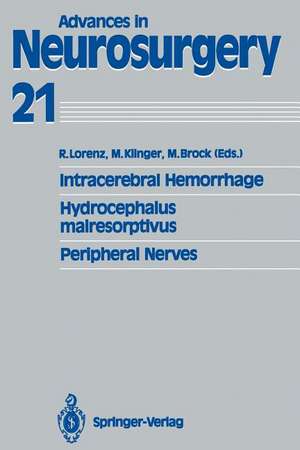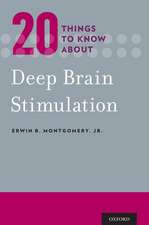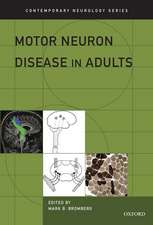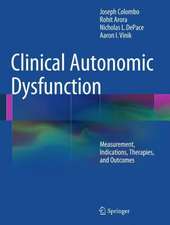Intracerebral Hemorrhage Hydrocephalus malresorptivus Peripheral Nerves: Advances in Neurosurgery, cartea 21
Editat de Rüdiger Lorenz, Margareta Klinger, Mario Brocken Limba Engleză Paperback – 29 apr 1993
Din seria Advances in Neurosurgery
- 5%
 Preț: 725.42 lei
Preț: 725.42 lei - 5%
 Preț: 727.24 lei
Preț: 727.24 lei -
 Preț: 398.92 lei
Preț: 398.92 lei - 5%
 Preț: 722.33 lei
Preț: 722.33 lei - 5%
 Preț: 722.33 lei
Preț: 722.33 lei - 5%
 Preț: 724.70 lei
Preț: 724.70 lei - 15%
 Preț: 643.84 lei
Preț: 643.84 lei - 15%
 Preț: 647.59 lei
Preț: 647.59 lei - 5%
 Preț: 721.56 lei
Preț: 721.56 lei - 5%
 Preț: 716.09 lei
Preț: 716.09 lei - 5%
 Preț: 381.91 lei
Preț: 381.91 lei - 5%
 Preț: 722.69 lei
Preț: 722.69 lei - 5%
 Preț: 718.46 lei
Preț: 718.46 lei - 5%
 Preț: 382.62 lei
Preț: 382.62 lei - 5%
 Preț: 722.48 lei
Preț: 722.48 lei - 5%
 Preț: 725.96 lei
Preț: 725.96 lei - 5%
 Preț: 716.28 lei
Preț: 716.28 lei - 5%
 Preț: 725.96 lei
Preț: 725.96 lei - 5%
 Preț: 729.42 lei
Preț: 729.42 lei - 5%
 Preț: 733.46 lei
Preț: 733.46 lei
Preț: 718.29 lei
Preț vechi: 756.09 lei
-5% Nou
Puncte Express: 1077
Preț estimativ în valută:
137.44€ • 143.51$ • 113.50£
137.44€ • 143.51$ • 113.50£
Carte tipărită la comandă
Livrare economică 15-29 aprilie
Preluare comenzi: 021 569.72.76
Specificații
ISBN-13: 9783540563044
ISBN-10: 3540563040
Pagini: 344
Ilustrații: XIII, 328 p. 67 illus.
Dimensiuni: 155 x 235 x 18 mm
Greutate: 0.48 kg
Ediția:Softcover reprint of the original 1st ed. 1993
Editura: Springer Berlin, Heidelberg
Colecția Springer
Seria Advances in Neurosurgery
Locul publicării:Berlin, Heidelberg, Germany
ISBN-10: 3540563040
Pagini: 344
Ilustrații: XIII, 328 p. 67 illus.
Dimensiuni: 155 x 235 x 18 mm
Greutate: 0.48 kg
Ediția:Softcover reprint of the original 1st ed. 1993
Editura: Springer Berlin, Heidelberg
Colecția Springer
Seria Advances in Neurosurgery
Locul publicării:Berlin, Heidelberg, Germany
Public țintă
ResearchCuprins
Intracerebrai Hemorrhage.- Spontaneous Intracerebral Hematomas: Clinical Appraisal of Surgical and Conservative Treatment.- Prognostic Factors and Surgical Indications in Spontaneous Lobar and Putaminal Hematomas.- Assessment of Prognosis and Indication for Surgery on the Basis of Cluster Analysis in Intracerebral Hematomas.- Intracerebral Hemorrhage. A Clinical Presentation of Durai Arteriovenous Fistulas of the Anterior Cranial Fossa: Diagnosis and Microneurosurgical Treatment.- Monitoring of Jugular Venous Oxygen Saturation in Patients with Intracerebral Hematomas.- Lysis of Intraventricular and Intracerebral Hematomas with Tissue Plasminogen Activator.- Prognostic Value of Initial Median Nerve Somatosensory and Brain Stem Auditory Evoked Potentials in Patients with Spontaneous Intracerebral Hemorrhage.- Computed Tomographic-Stereotactic Evacuation and Fibrinolysis of Spontaneous Intracerebral Hematomas.- Spontaneous Intercerebral Hermorrhages in Childhood.- Therapy and Prognosis in Spontaneous Cerebellar Hematomas.- Spontaneous Cerebellar Hermorrhage: Acute Management and Prognosis.- Cerebellar Hematomas: Prognosis and Risk of Upward Transtentorial Herniation.- Posterior Fossa Haematomas Secondary to Occult Angiomatous Malformation (Cavernomas).- Brainstem Hematomas Caused by Vascular Malformations: Results of Microsurgical Therapy.- Spontaneous Intracerebral Hematomas: Considerations in Atypical Presentations.- Morbidity and Mortality of Patients with Spontaneous Intracerebral Hematomas.- Stereotactic Evacuation and Local Fibrinolysis of Spontaneous Intracerebral Hematomas.- Hydrocephalus malresorptivus.- The Solved and Unsolved Problems of Hydrocephalus Valves: A Critical Comment.- External Ventricular Drainage for Treatment of Acute Hydrocephalus After Subarachnoid Hemorrhage.- Complications and Clinical Course After Shuting of Normal Pressure Hydrocephalus.- Intrathecal Infusion Test: An Investigative Method to Treat Malresorptive Hydrocephalus by Shunt Operation.- Long-Term Follow-up and Computed Tomography Cisternography in the Evaluation of Normal-Pressure Hydrocephalus.- Narrow Sulci at the Medial Brain Surface: A Feature of Normal-Pressure Hydrocephalus in Computerized Tomography?.- Aqueductal Cerebrospinal Fluid Flow Phenomena on Magnetic Resonance Imaging: Comparision with Intracranial Pressure and Cerebrospinal Fluid Dynamics.- Clinical Experience with a New Flow-Regulating Hydrocephalus Shunt System.- Management of Hydrocephalus in Craniosynostosis.- Intensive Care.- Effect of Head Elevation on Intracranial Pressure, Cerebral Perfusion Pressure, and Cerebrovenous Oxygen Saturation.- Interhemispheric Gradients in Head-Injured Patients: Their Evidence in Epidural Intracranial Pressure Measurement.- Improved Outcome from Traumatic Coma Using Only Ventricular Cerebrospinal Fluid Drainage for Intracranial Pressure Control.- Barbiturate Coma in Patients with Severe Head Injuries: Long-Term Outcome in 79 Patients.- Pre-hospital Airway Care and Control of Ventilation in Patients with Head Injuries: A Retrospective Analysis in 1623 Head Trauma.- Influence of Volume- and Pressure-Controlled Ventilation on the Intracranial Pressure with Continuous Propofol Sedation in Neurosurgical Patients.- The Influence of Nosocomial Pneumonia on Outcome of Severely Head-Injured Patients.- Peripheral Nerves.- Treatment of Peripheral Nerve Lesions.- What Is Special About Traumatic Brachial Plexus Lesions?.- Findings and Results of 80 Surgical Revisions for Carpal Tunnel Syndrome.- Radial Nerve Lesions Associated with Fractures of the Humerus or Radius: Results of Surgical Treatment.- Treatment Results of Anterior Submuscular Transposition and Medial Epicondylectomy for Ulnar Nerve Entrapment at the Elbow.- Ulnar Nerve Lesion During Lumbar Disc Operation.- Traumatic Lesions of the Lumbosacral Plexus: Microsurgical Treatment.- Autologous Transplantation in Injury of Cauda Fibers: Results of a Reconstruction of Transected L5 Filaments in a Luxation Fracture L4/5.- Factors To Be Considered in Nerve Anastomosis with Fibrin Adhesive.- Alternatives to Autologous Nerve Grafting.- Motor Unit Reorganization After End-to-End-Repair of an Experimentally Injured Peripheral Nerve.- Differential Localization of the Nerve Growth Factor Receptor in Tumors of the Peripheral Nervous System.- The Ansa Cervicalis Hypoglossal-Facial Anastomosis for Indirect Facial Nerve Reconstruction.- Lesions of the Accessory Nerve in Its Extracranial Course.- Results of Surgical Treatment of Meralgia Paresthetica.- Serum Neuron-Specific Enolase in Ischemic Brain Damage.- Preliminary Experience with Three-Dimensional Magnetic Resonance Angiography in the Identification of Intracranial Aneurysms.- Transarticular C1-C2 Screw Fixation Combined with Fusion of the Craniocervieal Junction in Arthritic Patients.- Strategy of Endovascular Treatment of Mixed Plexiform and Fistulous Intracranial Ateriovenous Malformations.- Proliferation Rate in Meningiomas: Validity of Ki-67 and Proliferation-Associated Nuclear Antigen Labeling Indices.- Winning Poster and Lecture Presentations.- Effect of the 21-Aminosteroid U-74389F on Brain Edema Following a Cryogenic Lesion in Rats.- Juxtamedullary Tumors of the Ventral Thoracic or Upper Lumbar Spine: A Posterolateral, Extracavital Operative Approach.- Activity of Ornithine Decarboxylase and Ki-67 Index in Meningiomas.- Comparative Study of Monocyte-Mediated Cytotoxicity and Biological Response Modifier-Mediated Cytotoxicity Against Malignant Human Brain Tumor Cells In Vitro.











